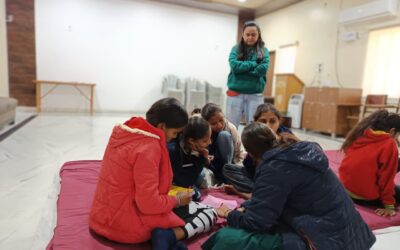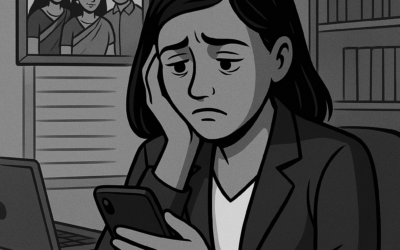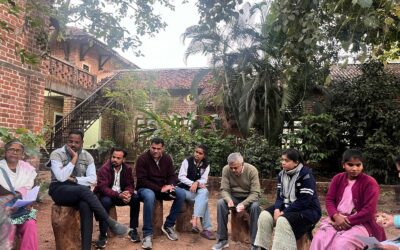Kanta ben is a member of the Karuna Sagar Mahila Bachat Mandal (SHG) for the last 12 years. She belongs to the Devipujak Samaj and resides in Bhuteshwar Bhagatwadi in Bhuj. Her husband, Naresh bhai became a council member of the Devipujak samaj’s Takrar Nivaran Centre (conflict resolution), set up with the support of KMVS and Sakhi Sangini, five years ago.
He also joined a Sakhi Sangini initiated Yuva Mandal (SHG), for men. Therefore, the couple has been actively participating in Sakhi Sangini activities and have contributed to community building for several years. Exposure to the concepts of gender equality transformed the couple into community leaders who began contributing towards the empowerment of women of their community.
Their Story
Naresh bhai owned a small business of catering and making homemade snacks such as puris, kachoris, chakli, etc. Kantaben lent a helping hand in this business, mainly in terms of production of their products. In addition, he would employ four other women from the community to help in production. This small business of theirs catered orders for 50-100 people, symbolising its small-scale production capacity.
The couple decided to procure a business loan to upscaling their business and provide employment to women of their community. This business loan would help them purchase a heavy-duty, multi-purpose machine for the production of snacks items. They hoped that as production would increase, they would be able to offer more wages. Women in their community do not feel comfortable going out for work. Therefore, their home-run business would become an ideal space for women to work and earn for themselves.
The Role Of Sakhi Sangini
Dreams Foundation, based in Ahmedabad, provides micro-credit and seed funding to grassroots entrepreneurial initiatives. Sakhi Sangini has been collaborating with Dreams Foundation for several years, in helping women obtain loans for economic independence. Therefore, Sakhi Sangini’s role has been that of a filter that analyses the loan applicant’s intent and needs. We also consider the woman’s SHG credit score and her financial stability.
The goal has always been to propel women’s financial independence, while ensuring that women do not fall into debt traps due to their inability to repay loans.
In the case of Kanta ben and Naresh bhai’s business plan, we identified their genuine intent to provide employment to the financially-vulnerable women of their community. We also saw the potential this business had to transform Kanta ben’s life. As the couple had been associated with Sakhi Sangini on various fronts, there was faith in their ability and sincerity.
Procuring Loan And The Aftermath

The first step in the process was to present a quotation of the equipment needed for production. They got a quotation from ‘Jackson Machine’, in Ahmedabad, for a Panpuri cutting machine, sakkarpara roller, samosa patti, puri roller and an electric kadhai for Rs 2.18L. Based on this, an interest-free loan for Rs 1.5L was offered. The rest of the amount was to be arranged by Naresh bhai separately.
Once this loan was passed and the machine was bought, Kanta ben and Naresh bhai began upscaling their business. They typically spend 5-6 hours working, where Kanta ben overlooks the production and packaging in its entirety. Naresh bhai focusses on the sale and distribution of the products. The couple note that the time spent on production of each product has reduced by 1-1.5 hours. They currently employ 6 women. After providing for their wages, monthly profit stands at about Rs 8000-9000.
Their Aspirations For The Business
It has been over a year since they purchased the machine and have paid 12 regular instalments of the loan. Their business has grown steadily over the course. Weekly production in their unit reaches 200-250 kilos, which is then sold to a fixed buyer. The seasonal nature of their current product line poses a challenge for the women employed at the production unit. Therefore, the couple is exploring the production of khakhra, a product with greater demand and market value.
Naresh bhai shared that most khakhra in Bhuj is imported. Having a local production unit can contribute to a lower market price of his product. This business expansion requires a significant investment. But the couple is optimistic about higher returns and its potential to generate sustained employment for 10-12 women.


Addressing Challenges In Accessing Credit
Individuals from low income households face immense challenge in obtaining loans from public institutions for entrepreneurial ventures. Bureaucratic hurdles, limited assets and poor credit score leave them vulnerable to NBFC (non-banking financial companies). Over the years, Sakhi Sangini has observed a steady rise in the presence of NBFC in Bhuj.
These entities often target low-income populations with high interest loans and minimal regulatory oversights. More often than not, a second loan is procured to repay the first one, trapping families in long-term debt. Medical emergencies compounded by lack of insurance exacerbate financial instability.
Sakhi Sangini’s micro finance program aims to address financial vulnerabilities directly. Through regular financial literacy with SHGs, we are creating vigilance about NBFC and their impact on low income households. Moreover, we highlight the importance of individual budgeting with SHG members, to avoid over lending and over spending. Another output of the program is to provide credit/finance to women and their families at low interest. The objective is to provide financial assistance to those in need, while responsible lending is priority one for the sustainability of the program.




0 Comments